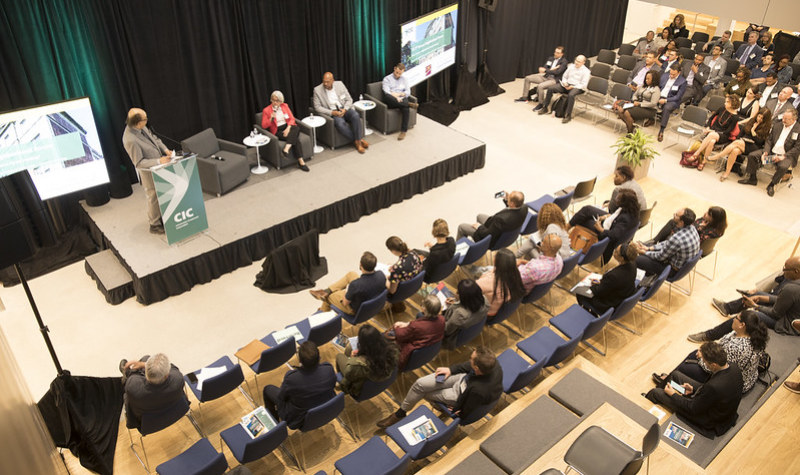Q&A with Dunni Cosey Gay, Director of The Preservation Compact
CIC is thrilled to welcome Dunni Cosey Gay as the new Director of The Preservation Compact.
Dunni brings extensive experience in the public and nonprofit sectors, and most recently served as the Deputy Director of Communications for the Cook County Bureau of Economic Development. While at the County, Dunni developed and implemented multimillion-dollar service-based programs for small businesses and residents, while also overseeing community outreach, marketing, and brand strategies for Cook County. Notably, Dunni coordinated outreach and communications for the County’s Emergency Rental and Utility Assistance program, which provided nearly $200 million in resources to support residents and housing providers impacted by the pandemic.
Known for cultivating relationships, developing strategic partnerships, and finding creative and innovative solutions to mobilize projects, Dunni has also served in various roles at the Chicago Cook Workforce Partnership, and the Departments of Housing and Community /Planning and Development at the City of Chicago.
Dunni holds a BAS in Public Policy – Political Science from Chicago State University, an MBA from Columbia College Chicago, and is a proud UChicago Harris School of Public Policy’s Civic Leadership Academy alumni.
Read on to learn more about the Preservation Compact’s new Director!
The Preservation Compact is a cross-sector collaborative housed at CIC that drives intentional, coordinated strategies to preserve affordable rental housing in Cook County.

Tell us a little about yourself.
My career has always centered on a few key elements: public service, meaningful partnerships, effective outreach, and creative problem-solving.
I began my career with the State of Illinois as a local government fellow for the Office of the State Comptroller, and later joined the City of Chicago to advance the housing and policy work for the Departments of Planning, Housing, Community, and Economic Development. Focusing on humanity in work, I diligently educated residents about critical housing, financial, and policy resources by planning outreach and engagement events in coordination with alderman and community groups. While serving on committees such as the Rent’s Rights, Historic Bungalow Association, and Chicago Low-Income Housing Trust, this work was most rewarding because it provided direct engagement with the people creating a policy framework to address tenants, landlords, developers, and building owners.
I most recently served as the Deputy Director of Communications at the Cook County Bureau of Economic Development. I contributed to creating and implementing a multi-million dollar suite of programs, which included a $10 M loan program, $29 M in small business grants, and more than $8M in resident cash assistance.
However, I’m most proud of my work implementing and creating a County-wide communications strategic plan engaging community organizations, public and private partners to generate awareness and education about the County’s resources and services. This included the Emergency Rental and Utility Assistance program, which provided nearly $200 million in resources to support residents and landlords impacted by the pandemic.
“Housing is the impetus of social, economic, and political stability. Living in a stable, adequate home that is affordable to the household yields many opportunities and more substantial outcomes for children, youth, and adults.”
Why affordable housing?
For me, it’s personal. I remember being young and watching my mother go through a tumultuous separation from my father, a prominent musician. When they separated, my mother had no resources, no car, no paying job as she was a full-time stay-at-home mother, and in her fight to care for her five children; I remember her saying the most critical resource she needed was a home. Once she had a stable environment for us, she focused on finishing her degree and building her resources to raise five children alone. She was able to stay in her home in part because she benefited from housing resources and tax support.
Housing is the impetus of social, economic, and political stability. Living in a stable, adequate home that is affordable to the household yields many opportunities and more substantial outcomes for children, youth, and adults. My work as a public servant yields more than 15 years of contributing to housing work. I’ve worked in Planning and Development, Housing, Workforce Development, and Economic Development. As a result, I have a well-rounded view and experience developing programs and partnerships that lead to equitable and thriving communities.
What excites you most about leading the Preservation Compact?
The Preservation Compact has a robust infrastructure thanks to its previous director and the existing team moving the needle on creating meaningful policy and partnerships. It’s a nationally recognized advocate for affordable multifamily housing, and I am most eager to continuing to strengthen our collaborations between building owners, government partners, community organizations, and others. I’m impressed by the many joint policy efforts developed by the Compact over the years, including the recently passed property tax incentive legislation for affordable rental housing. And I look forward to the opportunity of developing more real-world, effective solutions that the Compact is known for.
Lastly, when you’re not busy working to improve our region’s housing and communities, what is your go-to neighborhood restaurant or coffee shop?
I love Bani Beets! They are a small and mighty fresh pressed juice and health food cafe in Chicago’s south side Beverly neighborhood. When I can fit in a morning walk, I enjoy stopping by for a Beet It juice and the wonderful avocado toast.

To learn more about The Preservation Compact, visit www.preservationcompact.org.
NewsRead More
Related News

